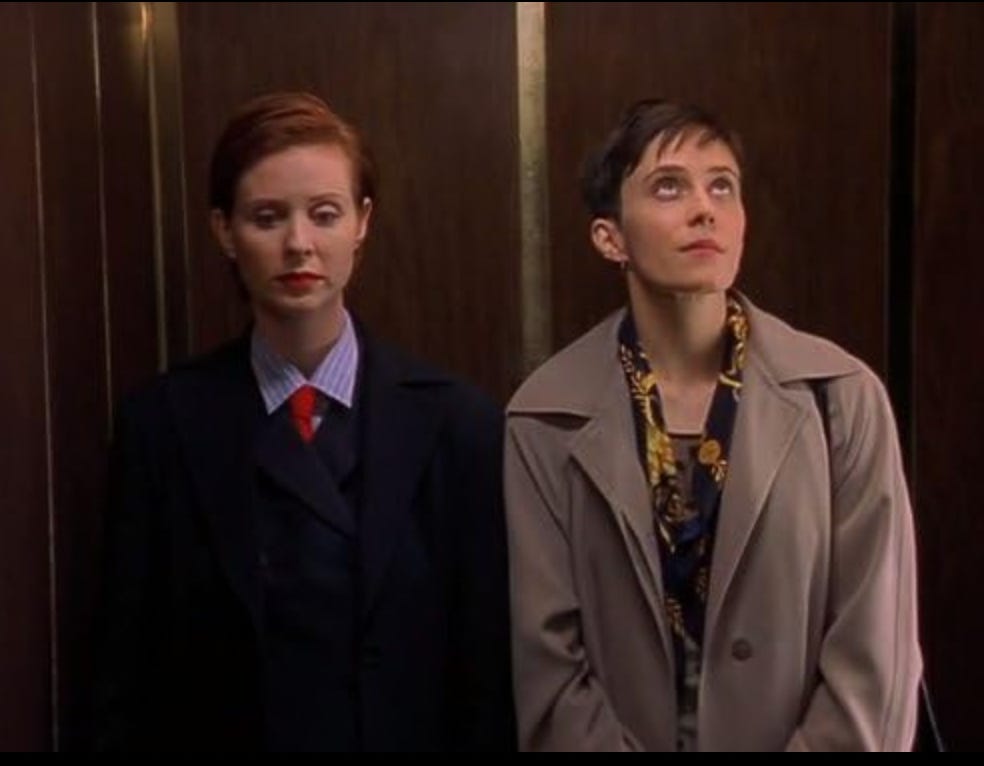Tracking The Finances of 30 Rock and Sex and the City
Previously in related coverage: Every time Liz Lemon is almost gay or something and T4T relationships on Sex and the City.
I promise to deliver in future coverage: A cross-analysis of both one-off SATC and 30 Rock episodes that ask why Miranda Hobbes and Liz Lemon aren’t lesbians. I also promise never to watch or discuss “And Just Like That…” so please don’t mention it here.
Things Liz Lemon has said that could just as easily have come from Carrie Bradshaw:
“Long distance is the wrong distance, Sue. Dealbreaker.” (S03E22, “Kidney Now!”)
“There’s no such thing as bisexual. That’s just something they invented in the ‘90s to sell hair products. Dealbreaker.” (Ibid.)
“Like you said, I’m a commodity now. My book is number 14 on the nonfiction bestseller chart, right behind The Founding Fathers’ Diet.” (S04E5, “The Problem Solvers.”)
Carrie Bradshaw has $700 in her checking account. Liz Lemon has $12,000 in her checking account. In season one of Sex and the City, the Dolce & Gabbana cashier cuts up Carrie’s credit card in front of her; in season one of 30 Rock Liz Lemon buys a wedding dress on impulse after a saleswoman tells her, “You know, a lot of women buy their perfect dress when they see it, and then just trust the fact that the husband will come.”
“I’m going to need to spread it over a couple of different credit cards,” Liz admits. Later she uses the dress as a “ham napkin,” at which point we learn the dress cost her $4,000 (roughly one-third of her liquid assets); later we see that she stores the dress on her treadmill. In season 7’s “Mazel Tov, Dummies!” she tells Jack she’ll get married in a sweatshirt because she threw the dress out “after Hurricane Irene — I had forgotten to stock up on toilet paper, but I had rememberd to stop up on seven-layer dip…”
Both Sex and the City and 30 Rock are profoundly interested in female abjection, although in SATC’s case the abjection usually comes in the form of spills and pratfalls (Carrie accidentally chipping Natasha’s tooth after being discovered with Big, the infamous runway fall, Miranda’s collapse in the shower, Kristen Johnston’s infamous season-six tumble out the window) and in 30 Rock’s case it’s much more likely to come in the form of digestive upset (Liz’ false pregnancy results as a result of too much Sabor de Soledad, her Meat-Cat-induced fever dream, Drew seeing her on the toilet, Liz projectile vomiting at Kenneth’s “last-ever” party in season one and during the tour of Real America in season four, and confessing to Floyd that she “pooped my pants a little bit at a Country Steaks all-you-can-eat buffet and didn’t leave until after I had finished my second plate of shrimp.”)
But while Sex and the City had no way of conceiving a person like Liz Lemon might possibly ever exist, the girls’ fingerprints are all over 30 Rock, much in the way a younger sibling might seek to preempt being told by their high school teachers that “You know, I had your older sister in my class last year.” Their doppelgangers actually appear in season 6’s “The Ballad of Kenneth Parcell,” calling Liz “Honey, sweetie, honey” in baffled affection as she struggles to find a new best friend; Liz dresses as Carrie not once but twice (first in the beginning of the season-three opener, in a belted cardigan worn over a full skirt, walking to a bossa-nova soundtrack that’s clearly meant to sound like a duplicate of the SATC theme while Jack catcalls her from a limousine, and once again while writing a complaint to Zappos in season seven’s “Stride of Pride”). At the end of Liz’ encounter with the SATC girls, she literally turns her back on them in order to say that she needs to go find her own version of the girls “at the Barnes and Noble bathroom.”
When Liz tells the “superfluously handsome” Peter Hermann that she is “not a lap sitter; I don’t sit on laps” in season one’s “The Head and the Hair,” she is saying in so many words, “I am not Carrie Bradshaw.” Carrie Bradshaw is an inveterate lap-sitter; she certainly sits on Timothy Olyphant’s lap at some point during his guest episode, and if I had more time I’d certainly be able to furnish futher evidence. (Peter Hermann, along with Dean Winters, is one of several boyfriends Liz shares with the SATC cast.)
She needs the Carrie-Miranda-Charlotte-Samantha axis to react against, although they don’t need her at all, an unbalanced dynamic 30 Rock was able to acknowledge as early as season one’s “Celeveland,” when Jenna says to Phoebe (Jack’s fiancée of several minutes) and Liz, “Wow. How Sex and the City are we? I’m Samantha, you’re Charlotte, and you’re the lady at home who watches us.”
30 Rock’s primary relationship, between Jack and Liz, could even be summarized as “What if Big and Carrie never slept together, but instead became really good work friends?” (With a few other tweaks, obviously. And in other ways Liz more closesly resembles season one’s Skipper than Carrie, or even Miranda, but the point stands.)
Both Liz and Carrie use their oven for storing clothes. From season 3’s “Attack of the Five Foot Ten Woman”:
MIRANDA: “Do you have a rolling pin?”
CARRIE: “On me?”
MIRANDA: “In your kitchen?”
CARRIE: “Are you kidding me? I use my oven for storage,” which a few seasons later she updates specifically to “sweaters.”
Meanwhile, in 30 Rock’s season two episode “Subway Hero,” when Liz and Jenna are still the sort of friends who walk to work together in the morning, Liz admits to having almost the exact same habit:
LIZ: “Do you know what I use my oven for?”
JENNA: “Warming your jeans in the morning?”
LIZ: “That’s right. And it feels good.”
But Carrie uses her oven for storage in a glamorous, abstemious way — the show is often vague about where and how often she gets her meals, since Carrie goes to restaurants to gossip, to meet men, to relax, and to drink, and only theoretically to eat — whereas Liz uses hers for a slightly suspect, slightly frat-boy form of infantile comfort, in order to replicate the feeling of wearing clothes freshly out of the dryer.
Both are defined repeatedly by their relationship to shoes (Liz “wore corrective shoes as a kid” to fix her “malformed extra baby foot,” Jack repeatedly comments on her “bi-curious” and “lesbian Frankenstein” shoes, her gay upstairs neighbor says that “I can’t afford to stay here on my own” when their building goes condo and “based on your shoes and teeth, I’m guessing you can’t either,” while Miranda points out that Carrie can’t put a down payment on her apartment because she has $40,000 worth of shoes in her closet), both manage to buy their own apartments by season four despite doing relatively little to change their relationship to money (Carrie panics whenever the subject of saving is so much as mentioned, and Liz admits that she gets all her money advice from PBS, flashing to a Blue’s Clues-style children’s show where a puppet asks the viewers, “Where should I put my money: In tech stocks, or the housing market?” to which Liz gleefully shouts, “Tech stocks, Foxy Moneybags! Tech stocks!”
More about money and Sex and the City, from a few years ago, when I discussed the budget inflation of the later seasons as an ascent-to-godhood á la the Fast and the Furious franchise:
Every year it seemed like their budget tripled, and the girls’ outfits (and handbags, and home furnishings, and so on) were accordingly swapped out for triple-ultra-deluxe upgrades. There were always people who found this frustrating and demanded to know how Carrie could afford her apartment, but it was merely a predictable ascension to godhood as a result of sustained heroism, like how the cast of the The Fast and the Furious franchise went from stealing DVD players and drag-racing on the weekends to becoming superheroes, piloting nuclear submarines, and returning from the grave to defeat death and pain…
[Carrie] keeps the same job, the same apartment, the same cheap gold-plated necklace with her name on it, while they get improbably richer and more powerful. Had there been a season seven, her boyfriend would have to have been some sort of war profiteer; had there been a season eight, there would have been nothing for it but to show her dating God.
Carrie always needed to get to Paris even before she developed a sort of sexual rivalry with the entire city when it stole Big from her in season two…
Both Carrie Bradshaw and Liz Lemon have “Skimpole Syndrome”1 when it comes to money: They are children in such things. They must be children in such things. They resist, sometimes charmingly and sometimes with real terror, any attempts to be forced to grow up on the subject. Liz certainly has more money in her checking account than Carrie, but she has no idea what to do with it, and she’s done nothing else to prepare for her financial future. In season 6 Jack says “In the 90s you gave money to the IRA,” to which Liz says she “thought” she was contributing to a retirement account; during various other conversations throughout the show on the subject, Liz repeatedly insists that her only retirement plan is to teach improv to seniors, sometimes on cruise ships and sometimes on land, if TGS ever goes off the air.
In the season two episode “Rosemary’s Baby,” Liz offers a look at her finances for Jack to review:
“I’m two payments away from owning my bike…Also I have a star that my aunt named after me, although that was recently downgraded to a gas giant.”
His advice? “Buy real estate.” (Not the most detailed or helpful of advice; we get the sense that he always withholds his real mentorship from Liz, especially by contrast with the detailed, specific, handholding care Jack provides her boyfriend Floyd with when he’s up for a promotion at work.)
At the beginning of the same episode she received a $10K check from G.E. for accepting a “Followship Award”; if you add that to her $12K in checkings, that must have been enough for a down payment on a New York apartment back in 2006 because she has an offer accepted at The Windmere later that week (“An oasis from the vile obscenity of the human condition”).
But it’s a surprise windfall, not a fundamental change in her relationship to money, and once her offer is rejected by the co-op board we hear no more about it until a big advance on her Dealbreakers book allows her to buy the apartment she already rents in season four. You could also call this attitude, as Colette Dowling did, the Cinderella Complex: “Personal, psychological dependency - the deep wish to be taken care of by others - is the chief force holding women down today….a network of largely repressed attitudes and fears that keeps women in a kind of half-light, retreating from the full use of their minds and creativity.”
The primary difference, as far as I can make out, between Carrie and Liz’ attitude towards money is that Carrie genuinely hopes that a man will come along to handle these things for her.2 This is the real reason her subsequent fight with Charlotte is so painful, incidentally, not just because asking a friend (no matter how rich) for $30K is a shock, but because Carrie is asking Charlotte to be the boy to her. (Is “being responsible with money” the same thing as “being the boy” in Carrie’s worldview? I think it might be, and I don’t think it’s an accident that she lashes out, in that moment of panic and instability, at her most traditionally feminine friend; Carrie not-infrequently leans on Miranda as an ersatz-boy (I promise I will get to that “why aren’t you a lesbian” episode analysis soon), who accepts the burden more or less uncomplainingly, and Samantha’s outrageous-for-the-time sexuality places her slightly outside of the boy-girl axis. But Charlotte, who is not used to being anything but The Girl 100% of the time, is nevertheless scrupulous about her money. She saves, she plans, she anticipates; she wants to be saved romantically but is herself prepared financially, which gives Carrie’s game away: It is not, in fact, necessary to womanhood to avoid looking at your bank account. Another way is possible, and Carrie needs to believe that her avoidance is inevitable, that a bailout has to be on the horizon.3
Liz is never “the girl” in her relationship with Jack (or with Devin, or even Dennis some of the time; people call her “little buddy,” “dummy,” “little guy,” “young man,” etc) except financially. There he condescends to her marvelously, bosses her around, and in every way performs to their mutual satisfaction.
Also in “Rosemary’s Baby,” Liz tells Jack that she’s terrified of turning into Carrie Fisher’s Rosemary, discarded and broke: “I can’t end up like that. I have got to make money and save it. And I have to do that thing rich people do where they turn money into more money. Can you teach me how to do that?”
“With my eyes closed,” Jack says. But he never really does.
In the same episode where Carrie is denied a bank loan, season four’s “Ring A Ding Ding,” she does something classically tasteless and honest; the sort of thing that makes so many people dislike her and yet makes her fundamentally interesting. (How many other TV characters from the 90s do so many people criticize as often as they do Carrie, thirty years on?)
She says, “Look, Linda, you’re single, right?” and “I just broke up with my fiance.” You’re not supposed to say that kind of thing at the bank, in a professional setting, but of course for Carrie these are professional financial truths, the only salient financial truths worth talking about. Liz solves this problem by almost exclusively dating deadbeats, which is why her financial floundering is funny while Carrie’s makes people furious. Liz can break up with Dennis or Criss or Wesley and if anything come out slightly better off (her financially intact boyfriends like Floyd, Drew, or Carol all have pretty good, not great, jobs, but they’re all mitigated by things like “moving to Cleveland,” “getting hooks for hands,” and “traveling all the time) than she was during those relationships.
Liz does occasionally have million-dollar ideas (she’s the girl who pioneered Button Classic, after all), but she never knows how to capitalize on them. “How about a button you push on your remote,” she pitches Jack in season five, “and you can buy anything you see on TV? Like if you’re watching Sex and the City and you just have to have Mr. Big’s spaghetti.”
You ought to be able to buy more things, faster, at the push of a button. That’s a good idea. Carrie wouldn’t want the spaghetti, but she could certainly get behind the idea.
As in Harold Skimpole, the wonderfully preening villain of Bleak House, whose catchphrase, always deployed in the refusal of responsibility, is “I am a child in such things, you know!”
A desire I find completely understandable! I suspect others do as well, which is why her character is so frequently and loudly criticized on the subject. But who doesn’t want to mentally retreat in the face of money?
Jenna is Liz’ foil in the same way — she is more flamboyantly, aggressively, and all-consumingly feminine, as she is forever reminding Liz, by way of her blondness, her celebrity, her sexual and romantic prowess — but is nevertheless absolutely ruthless on the question of money: “I own my place here,” she tells Liz nonchalantly in “Rosemary’s Baby,” as it begins to dawn on Liz that not everyone else in her cohort sees money the same way that she does, “my condo in Clearwater, Florida, and i bought some land in the Ninth Ward after Katrina. I’m leasing it back to the government as a prison. Ka-ching!” Tracy is also “a child in such matters,” but a child in the way of Mozart or an idiot savant; once he starts making money from his porn video game he never again experiences real financial problems like he did in season one, where he couldn’t finance his own Thomas Jefferson movie.






Re: bumbling in these two shows, and also who Liz is most similar to, I think Miranda and Liz both have a choking-on-dinner-alone-in-apartment scene that prompts deeper reflection. Wild!
Thank you Daniel for your reminder of other female fictional defenestrations. I recall it happening in Prague long ago, for real, with men. I wonder if that was the precedent. Thank you as always for your great writing.